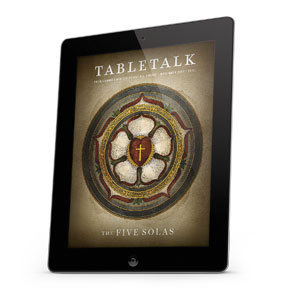R.C. Sproul's Blog, page 504
November 19, 2012
TULIP and Reformed Theology: Limited Atonement

I think that of all the five points of Calvinism, limited atonement is the most controversial, and the one that engenders perhaps the most confusion and consternation. This doctrine is chiefly concerned about the original purpose, plan, or design of God in sending Christ into the world to die on the cross. Was it the Father's intent to send His Son to die on the cross to make salvation possible for everyone, but with the possibility that His death would be effective for no one? That is, did God simply send Christ to the cross to make salvation possible, or did God, from all eternity, have a plan of salvation by which, according to the riches of His grace and His eternal election, He designed the atonement to ensure the salvation of His people? Was the atonement limited in its original design?
I prefer not to use the term limited atonement because it is misleading. I rather speak of definite redemption or definite atonement, which communicates that God the Father designed the work of redemption specifically with a view to providing salvation for the elect, and that Christ died for His sheep and laid down His life for those the Father had given to Him.
The redemption of specific sinners was an eternal plan of God...accomplished by the atoning work of Christ. —R.C. Sproul
One of the texts that we often hear used as an objection against the idea of a definite atonement is 2 Peter 3:8–9: "But do not overlook this one fact, beloved, that with the Lord one day is as a thousand years, and a thousand years as one day. The Lord is not slow to fulfill his promise as some count slowness, but is patient toward you, not wishing that any should perish, but that all should reach repentance." The immediate antecedent of the word any in this passage is the word us, and I think it's perfectly clear that Peter is saying that God is not willing that any of us should perish, but that all of us should come to salvation. He's not speaking of all mankind indiscriminately; the us is a reference to the believing people to whom Peter is speaking. I don't think we want to believe in a God who sends Christ to die on the cross and then crosses His fingers, hoping that someone will take advantage of that atoning death. Our view of God is different. Our view is that the redemption of specific sinners was an eternal plan of God, and this plan and design was perfectly conceived and perfectly executed so that the will of God to save His people is accomplished by the atoning work of Christ.
This does not mean that a limit is placed on the value or the merit of the atonement of Jesus Christ. It's traditional to say that the atoning work of Christ is sufficient for all. That is, its meritorious value is sufficient to cover the sins of all people, and certainly anyone who puts his or her trust in Jesus Christ will receive the full measure of the benefits of that atonement. It is also important to understand that the gospel is to be preached universally. This is another controversial point, because on the one hand the gospel is offered universally to all who are within earshot of the preaching of it, but it's not universally offered in the sense that it's offered to anyone without any conditions. It's offered to anyone who believes. It's offered to anyone who repents. Obviously the merit of the atonement of Christ is given to all who believe and to all who repent of their sins.
In the next post, we will consider the I in TULIP, irresistible grace.
See also:
TULIP and Reformed Theology: An Introduction
TULIP and Reformed Theology: Total Depravity
TULIP and Reformed Theology: Unconditional Election
TULIP and Reformed Theology: Limited Atonement
Scriptures for further study: John 6:37–39; 17:6–12; Romans 5:8–10; 1 John 4:9, 10; Revelation 5:9, 10

November 18, 2012
Twitter Highlights (11/18/12)
Here are highlights from our various Twitter accounts over the past week.
What Scripture ever said that the greatness of man's sin could hinder the greatness of God's mercy? (Thomas Hooker).
— Ligonier Academy (@LigonierAcademy) November 13, 2012
God does not foresee an action or condition on our part that induces Him to save us. —R.C. Sproul ligm.in/PSQ6NS
— Ligonier Ministries (@Ligonier) November 14, 2012
Reading @tabletalk on the iPad mini instagr.am/p/SEF6mFiamq/ (Get the app: ligm.in/TT-iPad)
— Ligonier Ministries (@Ligonier) November 15, 2012
"He who boasts of being perfect is perfect in folly." - Spurgeon
— Tabletalk Magazine (@Tabletalk) November 16, 2012
...abiding in Christ means allowing His Word to fill our minds, direct our wills, and transform our affections. —Sinclair Ferguson
— Reformation Trust (@RefTrust) November 16, 2012
The term “Born-again Christian” is often used, but what does it mean? Doctrine of Regeneration course is coming soon goo.gl/c3Iyt
— Ligonier Connect (@LigonierConnect) November 16, 2012
You have as much power to awaken yourself from spiritual death as a corpse has the power to awaken himself from physical death. —R.C. Sproul
— Ligonier Ministries (@Ligonier) November 18, 2012
You can also find our various ministries on Facebook:
Ligonier Ministries | Ligonier Academy | Ligonier Connect | RefNet
Reformation Bible College | Reformation Trust | Tabletalk Magazine

November 17, 2012
Download November's Tabletalk for Free
 Earlier this week we announced the availability of the new digital edition of Tabletalk magazine for iPad™ users. We are pleased to be able to offer this benefit to subscribers who enjoy the convenience that comes with the digital format. But whether you currently subscribe to the print edition of Tabletalk or not, we’ve made November’s digital issue free for everyone so as many people as possible can try our new app and experience this unique publication.
Earlier this week we announced the availability of the new digital edition of Tabletalk magazine for iPad™ users. We are pleased to be able to offer this benefit to subscribers who enjoy the convenience that comes with the digital format. But whether you currently subscribe to the print edition of Tabletalk or not, we’ve made November’s digital issue free for everyone so as many people as possible can try our new app and experience this unique publication.
We encourage you to take us up on this offer and download November’s Tabletalk issue for free. In addition to articles that examine the five solas of the Protestant Reformation, R.C. Sproul teaches us how to apply the Proverbs, John Piper writes about the “blazing” glory of God, and Bob Kauflin explains why we should think twice before “cutting out on” Sunday worship.
If you’ve never read Tabletalk, we’re certain you’ll soon discover why it has become a touchstone for biblical living for thousands of Christians.
Download Tabletalk for iPad™

November 16, 2012
$5 Friday: Church History, Last Days, & Thanksgiving

It's time for our weekly $5 Friday sale. This week's resources cover such topics as church history, the last days, thanksgiving, stewardship, the doctrines of grace, abortion, theology, and more.
Sale runs through 12:01 a.m. — 11:59 p.m. Friday EST.
View today's $5 Friday sale items.

The 3 Tenses of the Gospel

We never get past the gospel. What saved us in the past, when we were still in our sins—fallen sons of Adam by nature—was the grace of God in the gospel. Nowhere is that put more succinctly than in Ephesians: "For by grace you have been saved through faith. And this is not your own doing; it is the gift of God, not a result of works, so that no one may boast" (Eph. 2:8–9).
But the New Testament can also speak about our salvation in the present tense—we are "being saved" (1 Cor. 1:18; 2 Cor. 2:15)—as well as in the future tense—we "shall . . . be saved" (Rom. 5:9).
There is only one salvation and one way of salvation. What occurred in our past, works itself out in the present, and comes to consummation in the future is all of a piece. Justification now leads to glorification then (Rom. 8:29–30).
True, some talk unadvisedly about being "saved again," as though salvation could be lost one day and regained the next. In truth, some who speak this way were never saved in the first place. They had made a decision, but it was just that—a human decision and not a sovereign, life-renewing work of the Holy Spirit "from above" (cf. John 3:3, 5). Others who speak this way may have been converted but never acquired the fullness of assurance that should accompany it; when they did, it felt like a new birth all over again.
Why, then, does the New Testament speak of salvation in three tenses? The answer lies in considering what happens in salvation. Initially, at the point of regeneration, our sins are forgiven— entirely and completely. We have been delivered from sin's penalty. Through faith, we are reckoned to be righteous—as righteous as Christ is. Then, there is sanctification—a process whereby we are being delivered from sin's power. Ultimately, in heaven, we will be delivered from sin's presence. John Stott has argued that when Paul reasoned with Governor Felix about "righteousness and self-control and the coming judgment" (Acts 24:25), he was pointing out the three tenses of salvation.
At every stage—justification, sanctification, glorification— we come with empty hands, seeking mercy from our heavenly Father. Even at the point of our obedience as Christians—we are to "work out [our] salvation with fear and trembling" (Phil. 2:12)—we do so only because God works "in [us], both to will and to work for his good pleasure" (v. 13). And when we enter the Pearly Gates of heaven, wisdom will dictate that we show our empty hands and say with Edward Mote:
On Christ the solid Rock I stand;
All other ground is sinking sand.
The moment we drift away from the gospel, we perish. But if we remain on the narrow gospel way, it brings us all the way home.
This excerpt is adapted from Derek Thomas' How the Gospel Brings Us All the Way Home.

November 15, 2012
Digital Tabletalk Now Available

Ligonier Ministries strives, with your support, to leverage new media technology for the advancement of God's Kingdom. To that end, we're pleased to announce that the digital edition of Tabletalk magazine is now available for your iPad™. Lord willing, before Christmas, we'll announce Tabletalk's availability on the Kindle Fire and Android tablets.
We have taken great care to embed the world-class design of the print edition into the digital edition. We want to ensure you have the same rich experience while reading Tabletalk on a tablet as you would while reading the print edition.
Want Tabletalk Digitally Each Month? Become a Print Subscriber
An active print subscription entitles you to freely receive digital issues of Tabletalk on your iPad™, and in the near future Kindle Fire and Android tablets. Enjoy the convenience of having multiple issues available on multiple devices, and the freedom to share your print edition with family and friends.
If you're new to Tabletalk, here's how to get access quickly:
Create a Ligonier.org account by clicking "Create Account" at the top right of Ligonier.org
While logged in to that account, subscribe to the print edition or begin a free 3-month trial
Download Tabletalk for iPad™
Click "My Account" in the Tabletalk app and login with your Ligonier.org account details.
Already a Print Subscriber?
If you already subscribe to Tabletalk, to access recent digital issues (back to July 2012) and future issues, you'll need to click "My Account" in the Tabletalk app and login with your Ligonier.org account details. If you don't have a Ligonier.org account, create one by clicking "Create Account" at the top right of Ligonier.org. Note: Be sure to supply the same name and shipping details as your current Tabletalk subscription.
Need help? Please email service@ligonier.org or call 800-435-4343.
Read November's Issue Free
Whether you currently subscribe to the print edition of Tabletalk or not, we've made November's digital issue free so as many people as possible can try our new app and experience this unique publication.
Download Tabletalk for iPad™
Knowing that so many read Tabletalk each month encourages us greatly at Ligonier Ministries. Thank you for your prayers and support as we strive to improve this ministry resource.

No Other Gospel
Here's an excerpt from No Other Gospel, Burk Parsons' contribution to the November issue of Tabletalk.
When you enter the sanctuary of Saint Andrew's Chapel, you cannot help but notice the majestic pulpit that rises from the chancel and towers above the congregation. Although the pulpit is relatively plain in its structure and design, there is one unique feature to the pulpit that is noticed only upon a closer look. In the very center is an ornately carved emblem of a cross surrounded by rose petals. The emblem is a replica of the Luther Rose—the crest of the sixteenth-century Reformer Martin Luther. Luther designed the crest to teach the gospel to others, particularly the illiterate and children. The focal point of the Luther Rose draws our eyes to the central tenet of Luther's theology—the cross.
Continue reading No Other Gospel.

November 14, 2012
Statism: The Biggest Concern for the Future of the Church in America

"A decree went out from Caesar Augustus that all the world should be registered…." In Luke 2, the well-known passage introducing the nativity story, the title accorded to the Roman emperor is Caesar Augustus. Had this census been mandated earlier under the monarchy of Julius Caesar, the Scripture would read: "A decree went out from Julius Caesar…." Had Octavian followed the model of Julius, he would have called himself Octavianus Caesar, and then the text would read: "A decree went out from Octavianus Caesar…." But we note Octavius' explicit change of his personal name to the title Caesar Augustus. This indicates the emerging dimension of the emperor cult in Rome, by which those who were elevated to the role of emperor were worshiped as deities. To be called "august" would mean to be clothed with supreme dignity, to which is owed the reverence given to the sacred. The elevation of the emperor in Rome to this kind of status was the ancient zenith of statism.
About thirty years ago, I shared a taxi cab in St. Louis with Francis Schaeffer. I had known Dr. Schaeffer for many years, and he had been instrumental in helping us begin our ministry in Ligonier, Pennsylvania, in 1971. Since our time together in St. Louis was during the twilight of Schaeffer's career, I posed this question to him: "Dr. Schaeffer, what is your biggest concern for the future of the church in America?" Without hesitation, Dr. Schaeffer turned to me and spoke one word: "Statism." Schaeffer's biggest concern at that point in his life was that the citizens of the United States were beginning to invest their country with supreme authority, such that the free nation of America would become one that would be dominated by a philosophy of the supremacy of the state.
In statism, we see the suffix "ism," which indicates a philosophy or worldview. A decline from statehood to statism happens when the government is perceived as or claims to be the ultimate reality. This reality then replaces God as the supreme entity upon which human existence depends.
In the nineteenth century, Hegel argued in his extensive and complex study of Western history that progress represents the unfolding in time and space of the absolute Idea (Hegel's vague understanding of God), which would reach its apex in the creation of the Prussian state. The assumption that Hegel made in the nineteenth century was made before the advent of Hitler's Third Reich, Stalin's Russia, and Chairman Mao's communist China. These nations reached an elevation of statism never dreamed of by Hegel in his concept of the Prussian state.
In America, we have a long history of valuing the concept of the separation of church and state. This idea historically referred to a division of labors between the church and the civil magistrate. However, initially both the church and the state were seen as entities ordained by God and subject to His governance. In that sense, the state was considered to be an entity that was "under God." What has happened in the past few decades is the obfuscation of this original distinction between church and state, so that today the language we hear of separation of church and state, when carefully exegeted, communicates the idea of the separation of the state from God. In this sense, it's not merely that the state declares independence from the church, it also declares independence from God and presumes itself to rule with autonomy.
The whole idea of a nation under God has been challenged again and again, and we have seen the exponential growth of government in our land, particularly the federal government, so that the government now virtually engulfs all of life. Where education once was under the direction of local authorities, it now is controlled and directed by federal legislation. The economy that once was driven by the natural forces of the market has now come under the strict control of the federal government, which not only regulates the economy, but considers itself responsible for controlling it. Where we have seen the largest measure of the loss of liberty is with respect to the function of the church. Though the church is still somewhat tolerated in America (in a way it was not tolerated in Mao's Red China and under Stalin), it is tolerated only when it remains outside of the public square. In other words, the church has been relegated to a status not unlike that given to the native Americans, where the tribes were allowed to continue to exist as long as they functioned safely on a reservation, outside of any significant influence on the government. So although the church has not been banished completely by the statism that has emerged in America, it has been effectively banished from the public square.
Throughout the history of the Christian church, Christianity has always stood over against all forms of statism. Statism is the natural and ultimate enemy to Christianity because it involves a usurpation of the reign of God. If Francis Schaeffer was right — and each year that passes makes his prognosis seem all the more accurate — it means that the church and the nation face a serious crisis in our day. In the final analysis, if statism prevails in America, it will mean not only the death of our religious freedom, but also the death of the state itself. We face perilous times where Christians and all people need to be vigilant about the rapidly encroaching elevation of the state to supremacy.
This article was originally published in Tabletalk magazine.

Wisely Handling the Bible's Wise Sayings
Here's an excerpt from Wisely Handling the Bible's Wise Sayings, R.C. Sproul's contribution to the November issue of Tabletalk.
Every culture seems to have its own unique, collected wisdom, pithy insights of the wise. Oftentimes, these tidbits of wisdom are preserved in the form of the proverb. We have proverbial sayings in American culture. I am thinking of sayings such as "A stitch in time saves nine" or "A penny saved is a penny earned."
The Bible, of course, has an entire book of such pithy sayings—the book of Proverbs. However, this compilation of proverbial wisdom is different from all other such collections in that these sayings reflect not just human wisdom but divine wisdom, for these proverbs are inspired by God.
Still, we must be very careful in how we approach and implement these wise sayings. Simply because they are inspired does not mean that the biblical proverbs are like laws, imposing a universal obligation. Yet, some people treat them as if they were divine commandments. If we regard them in that way, we run into all kinds of trouble. Even divinely inspired proverbs do not necessarily apply to all life situations. Rather, they reflect insights that are generally true.
Continue reading Wisely Handling the Bible's Wise Sayings.

TULIP and Reformed Theology: Unconditional Election

The Reformed view of election, known as unconditional election, means that God does not foresee an action or condition on our part that induces Him to save us. Rather, election rests on God's sovereign decision to save whomever He is pleased to save.
In the book of Romans, we find a discussion of this difficult concept. Romans 9:10–13 reads: "And not only so, but also when Rebekah had conceived children by one man, our forefather Isaac, though they were not yet born and had done nothing either good or bad—in order that God's purpose of election might continue, not because of works but because of him who calls—she was told, 'The older will serve the younger.' As it is written, 'Jacob I loved, but Esau I hated.'" Here the Apostle Paul is giving his exposition of the doctrine of election. He deals with it significantly in Romans 8, but here he illustrates his teaching of the doctrine of election by going back into the past of the Jewish people and looking at the circumstances surrounding the birth of twins—Jacob and Esau. In the ancient world, it was customary for the firstborn son to receive the inheritance or the patriarchal blessing. However, in the case of these twins, God reversed the process and gave the blessing not to the elder but to the younger. The point that the Apostle labors here is that God not only makes this decision prior to the twins' births, He does it without a view to anything they would do, either good or evil, so that the purposes of God might stand. Therefore, our salvation does not rest on us; it rests solely on the gracious, sovereign decision of God.
God does not foresee an action or condition on our part that induces Him to save us. —R.C. Sproul
This doesn't mean that God will save people whether they come to faith or not. There are conditions that God decrees for salvation, not the least of which is putting one's personal trust in Christ. However, that is a condition for justification, and the doctrine of election is something else. When we're talking about unconditional election, we're talking in a very narrow confine of the doctrine of election itself.
So, then, on what basis does God elect to save certain people? Is it on the basis of some foreseen reaction, response, or activity of the elect? Many people who have a doctrine of election or predestination look at it this way. They believe that in eternity past God looked down through the corridors of time and He knew in advance who would say yes to the offer of the gospel and who would say no. On the basis of this prior knowledge of those who will meet the condition for salvation—that is, expressing faith or belief in Christ—He elects to save them. This is conditional election, which means that God distributes His electing grace on the basis of some foreseen condition that human beings meet themselves.
Unconditional election is another term that I think can be a bit misleading, so I prefer to use the term sovereign election. If God chooses sovereignly to bestow His grace on some sinners and withhold His grace from other sinners, is there any violation of justice in this? Do those who do not receive this gift receive something they do not deserve? Of course not. If God allows these sinners to perish, is He treating them unjustly? Of course not. One group receives grace; the other receives justice. No one receives injustice. Paul anticipates this protest: "Is there injustice on God's part?" (Rom. 9:14a). He answers it with the most emphatic response he can muster. I prefer the translation, "God forbid" (v. 14b). Then he goes on to amplify this response: "For he says to Moses, 'I will have mercy on whom I have mercy, and I will have compassion on whom I have compassion'" (v. 15). Here the Apostle is reminding his reader of what Moses declared centuries before; namely, that it is God's divine right to execute clemency when and where He desires. He says from the beginning, "I will have mercy on whom I will have mercy." It is not on those who meet some conditions, but on those whom He is pleased to bestow the benefit.
In the next post, we will consider the L in TULIP, limited atonement.
See also:
TULIP and Reformed Theology: An Introduction
TULIP and Reformed Theology: Total Depravity
TULIP and Reformed Theology: Unconditional Election
Scriptures for further study: Romans 8:28–39; Ephesians 1:3–14; 2:8; 2 Timothy 1:9, 10

R.C. Sproul's Blog
- R.C. Sproul's profile
- 1931 followers




